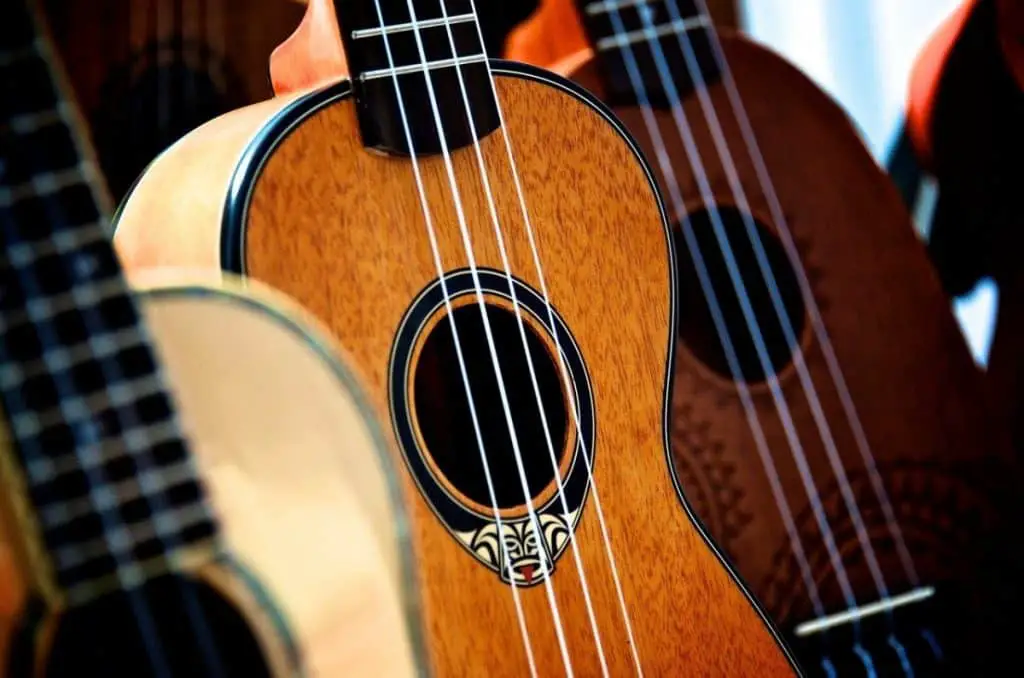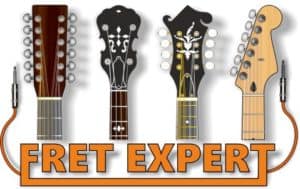Everybody will have a different experience when it comes to learning a new skill set.
However, here I’ll discuss aspects of learning that many new players have already gone through or are likely to go through during their ukulele journeys. So how hard is the ukulele to learn?
Overall, learning the ukulele is not very hard for most people, which is why it’s one of the most popular instruments in the world. The learning curve is short – even a beginner can pick up some basic chords and play!
As with most instruments though, getting better at ukulele will take time and practise, so it depends on how patient you are, and how much time you put into it.
In a traditional ‘do you want to the good news or the bad news first’ vein, I’ll begin with some reasons why beginners struggle with the ukulele in the initial stages of getting to grips with the instrument.
Before I go into that, I’ve partnered with Uke Like The Pros to get my readers 20% off ALL their courses, including all the beginner ones. If you’re thinking about learning the uke and want to make it as easy as possible, I’d recommend checking out their courses – they’ll shorten the learning curve dramatically.
Covered in this Article:
5 Reasons You Might Find the Ukulele Hard to Learn
As much as I would like to provide you with a quick route to success with regard to technical proficiency, there really is no substitute for practice.
Try not to get too despondent if you don’t feel you’re making the instant progress you might have imagined. It’s not a race and everyone needs to move forward at a pace they personally feel comfortable with.
So let’s begin with five reasons why new players can struggle to get on the first rung of the learning ladder!
1. Getting a Ukulele as Your First Ever Fretted or Stringed Instrument
Expectations can often clash with the reality of actually picking up a new instrument and to start learning from scratch.
This is particularly true if you have little or no experience with another fretted or stringed instrument such as the guitar, banjo or violin.
Your fingers have to develop muscle memory to fall into the correct positions without any hesitation or searching around for the right fingers. If you’ve never picked up a similar instrument before – you might find it a bit more difficult at first.

2. Trying Too Much, Too Soon
A lot of beginners make the mistake of trying to play at the same tempo as a more experienced player or a favorite recording they’re trying to emulate. In reality, nothing beats slow and steady when it comes to learning a new piece or a new chord.
Even professional musicians will prioritise accuracy over speed when it comes to learning a new or technically challenging piece of music. Don’t run before you can walk is particularly true when it comes to music at all levels of technical proficiency.
If you try to start with advanced ukulele playing, you’re going to lose heart faster than if you’d steadily increased your skill.
3. Beginning With Poor Technique
Try to use the correct fingers in the initial stages of learning. Some newbies believe they can use any combination of fingers, particularly on some of the simpler chords.
Although in one sense this is partially true in some cases, the choice of the fingers you use will have a knock-on effect as you move onto the next chord. You might well find you start getting tangled up in an awkward flurry of flailing fingers.
Good habits will hold you in good stead as you progress onwards and upwards. A good tutor here can be invaluable – or learning from a decent course. It’s a bit like driving, if you don’t learn from a professional you might start with bad habits that are hard to shake off!

4. Incorrect Finger Positioning That Holds You Back
Not everybody will agree with me on this particular point, but try to avoid using your thumb on the re-entrant fourth ‘G’ string.
It’s very tempting to hang your thumb over the fretboard and use it for a seemingly simple chord such as Am, but again this leads to a lack of flexibility when you transition onto another neighbouring chord shape.
A re-entrant tuning is one which doesn’t follow a logical high to low sequence. The ukulele is a case in point, where the lowest sounding string isn’t the 4th string (G), but the 3rd (C). Not all ukulele players use re-entrant tuning, though, with some preferring a low G.
5. Starting with a Poor Quality Ukulele
A crucial, but often ignored point is try to purchase a reliable starter instrument.
There is a belief among the less informed uke buying community out there that you shouldn’t spend more than about $20.00-$30.00 on an instrument for a total beginner. To use an analogy, it’s like buying an uncomfortable pen or a blunt pencil in the mistaken belief that you don’t need anything better until you progress.
In reality, this becomes a bar to progress in itself, if the implement or instrument you’re using is below par or difficult to use. Saying that, you don’t have to spend $200 to $300 on a ukulele to attain good results. Just try to strike a happy medium.

5 Reasons The Ukulele is Easy to Learn
Now onto the good cop section of why the ukulele is the ideal starter instrument for people of all ages and levels of musical experience.
1. The Fundamentals Can Be Picked Up Quickly
The ukulele’s popularity over the last few years has sky rocketed because it garners instant results with a minimum of effort.
A case in point is the chord shape everybody generally starts with – the ‘C’ or C major chord. It involves one finger on the third fret of the first string and voila!…you’re on your way with the minimum of effort.
Although I’m going against my own advice here, it’s important in the case of a young child to let them use a finger they feel most comfortable with. Ideally, it should be their left hand ring finger, but it’s certainly not the end of the world if their index finger automatically comes into play! Adults should try to stick to the correct fingering if at all possible.
2. You Can Play Whole Songs with Basic Chords
You only have to learn around 3 different chords to start playing many well known songs. A number of songbooks, online tuition sites and videos concentrate on this very thing. A lot of rock & roll and folk music in particular is rooted in the use of simple chord structures, albeit in any number of different keys.
Whereas a new guitarist is likely to learn the popular E, A, B chord progression, the beginner ukulele player can attain very similar results by learning the G, C, D sequence.
The chords may differ, but the relationship between them is identical, but in a different key. For example, here are four of the most popular beginner’s ukulele chords – which are very easy to learn.

3. Ukuleles are Small and Portable – with Minimal Setup
Size and portability is another important factor in choosing the ukulele as your first port of call. Its physical size makes it accessible enough for a child as young as 4 to start learning without having the struggle associated with an instrument like the guitar, even if it’s a 1/4 size model.
You can also comfortably carry a uke case onto an aircraft or on public transport without all the issues associated with a much larger instrument.
Using my daughter as an example, she happily carried her uke to school in a soft case, as well as having to carry a backpack and packed lunch at the same time.
Even a very young child will have little problem carrying a uke around. For adults, the convenience may also be preferable to a bulky guitar case.

4. There’s a Wide, Accessible Range of Music to Learn
A number of years ago the ukulele was relegated to the status of a child’s toy, an undeserved title, but one which gradually took place following it’s early popularity during the 1920s and 1930s.
Now, thanks to the internet and YouTube in particular, more and more people started seeing the musical possibilities the humble little uke could take advantage of, thanks to trailblazers such as Jake Shimabukuro, James Hill and The Ukulele Orchestra of Great Britain.
Today, the uke only plays second fiddle (as it were) to the guitar as the instrument of choice for many many people. It’s capable of playing everything from the Beatles to Bach and is now considered a so-called ‘serious’ yet accessible instrument in its own right.
The ukulele is also a great instrument for those wishing to accompany themselves singing their favourite popular songs.
The uke is equally at home in the company of other instruments such as the guitar and piano and provides a perfect contrast to its musical compatriots. No matter what style of music you want to learn, the uke can fit in nicely.

5. Decent Quality Instruments Don’t Break the Bank
As I alluded to a little earlier, the cost of a ukulele is unlikely to be prohibitive for most people. A very playable starter instrument is available for as little as $50.00. A used model may well be even less.
This means that unlike other instruments, where you really have to get an expensive, well made one to start learning ‘properly’, you can pick up a mid-priced uke and play that instrument up to a professional level. Also, if you decide it’s NOT for you, you haven’t spent a fortune either.
You can’t go super-cheap, though! As attractive to a young child in particular as a pretty pink plastic model might seem, it’s very much a road to nowhere in a musical sense – please avoid!
As you progress, you may well wish to upgrade to a better model. It’s a cliché, but it still holds true, that you generally get what you pay for! Many of you may be surprised to learn that a top-quality instrument will run well into the four-figure price bracket – but thankfully most of us neither want nor need to get that level.
Reminder: Uke Like The Pros have kindly offered 20% off ALL courses to my blog readers, so if you want to start learning quickly and easily, check out their many courses on getting started with the ukulele, plus some expert ones, too.
I hope this goes some way to helping you decide whether you’ll find the ukulele easy or hard to learn. Happy playing!
